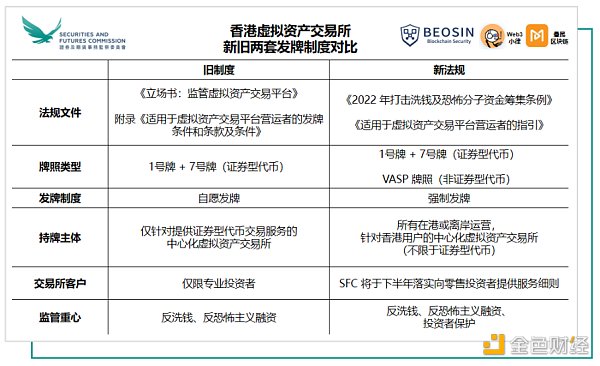Hong Kong banks refuse to open accounts despite new cryptocurrency regulations? How are regulatory agencies responding to these concerns?
Are Hong Kong banks still refusing to open accounts despite new cryptocurrency regulations? How are regulators addressing these concerns?Original author: Felix, BlockingNews
After the cryptocurrency market collapsed by $1.5 trillion in 2022 and several well-known companies, such as FTX, went bankrupt, the cryptocurrency industry has been under scrutiny from regulatory agencies around the world, including the SEC in the United States, which recently brought lawsuits against Binance and Coinbase. Meanwhile, Hong Kong has been seen as a crypto-friendly place since the official launch of cryptocurrency trading platform applications on June 1. Hong Kong legislator Wu Chi-wai even said that global virtual asset trading platforms, including Coinbase, are welcome to apply for compliance platforms in Hong Kong. However, in reality, cryptocurrency companies have encountered difficulties in obtaining banking services in Hong Kong due to strict KYC and anti-money laundering rules.
On June 15, according to informed sources cited by the Financial Times, the Hong Kong Monetary Authority has questioned why banks in the UK and China do not accept cryptocurrency exchanges as customers, including putting pressure on HSBC, Standard Chartered Bank, and Bank of China to accept cryptocurrency exchanges as customers. In a letter to banks dated April 27, the Hong Kong Monetary Authority stated that “due diligence on potential customers should not ‘create undue burden,’ especially for those who have set up offices in Hong Kong to seek opportunities here.”
Responding to questions, an HSBC spokesperson said: “We are engaging in active dialogue with virtual asset participants on a range of topics, including but not limited to account opening. We continue to monitor policy and developments in this emerging industry in Hong Kong.” Standard Chartered Bank said it was having “regular dialogue” with regulators on different topics. Bank of China declined to comment.
- Commonwealth Bank of Australia suspends some cryptocurrency payments to ensure investor asset security
- Comparison of Cryptocurrency Policies between Hong Kong and Singapore
- Hong Kong Monetary Authority and Central Bank of the UAE Strengthen Cooperation on Virtual Asset Regulation and Development
It is reported that banks and payment settlement merchants have difficult relationships with global cryptocurrency companies. Last year, some payment settlement merchants cut off services to local exchanges in India. Although there is no ban on cryptocurrency customers in Hong Kong, banks seem unwilling to participate in the industry because they are afraid of facing legal action in the event of fraud.
Faced with the concerns of banks, Hong Kong is actively engaging in dialogue. On June 16, Bloomberg cited informed sources as saying that the Hong Kong financial regulator had convened banks, cryptocurrency platforms, and other industry participants on Monday of this week to discuss how to solve the ongoing challenges that cryptocurrency companies face in opening bank accounts. Encourage banks to provide services to virtual asset companies. One informed source said, “The HKMA encourages banks not to be afraid, and there is resistance to traditional banking thinking.” A spokesperson for the Hong Kong Monetary Authority said that in fact, “the central bank ‘maintains close dialogue with the banking industry and relevant stakeholders on various topics from time to time.'”
According to reports, this is the second meeting held by Hong Kong regulatory agencies to encourage more banks to participate in the cryptocurrency field since late April. Earlier, the Hong Kong Monetary Authority held a roundtable discussion with the banking industry and some virtual asset-related organizations to directly communicate for the “difficulties in opening accounts”. About 20 banks and a similar number of cryptocurrency-related companies participated in the roundtable discussion to solve the needs of the banking industry. In response to this meeting, a spokesperson for the Hong Kong Monetary Authority said in an email, “Our general practice is not to confirm, deny or comment on any of these meetings.”
As the United States and other countries are heavily regulating the cryptocurrency industry, the recent questioning and meetings proposed by Hong Kong not only release positive signals, but also aim to build a “global cryptocurrency center” with full force. On June 1, the Securities and Futures Commission of Hong Kong (SFC) issued the “Guidelines for Virtual Asset Trading Platform Operators”, which came into effect officially. By issuing VSP licenses for trading virtual assets, it is hoped to create a more standardized and transparent order of cryptocurrency asset trading. Whether Hong Kong can become a global cryptocurrency “holy land” in the future is unknown, but it seems to be working towards this goal at present.
We will continue to update Blocking; if you have any questions or suggestions, please contact us!
Was this article helpful?
93 out of 132 found this helpful
Related articles
- Notice of the General Office of the People’s Government of Beijing Municipality on Printing and Distributing “Several Measures to Promote the Innovative Development of General Artificial Intelligence in Beijing”
- Will the cryptocurrency policy in the US and Canada see a new direction in the 2024 presidential election?
- Interpretation of the "2020 Cryptocurrency Act": New Ideas for the Cryptocurrency Regulation Model
- Investigation | After the ban is lifted, Indian investors are more positive about cryptocurrencies
- Babbitt Column | Case Study: Free Sugar Spreading Gives Miners, Also a Crime?
- An article detailing Switzerland's cryptocurrency policy
- Sex crime in room N opens "digital new normal"






